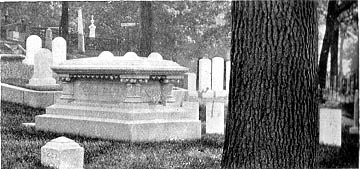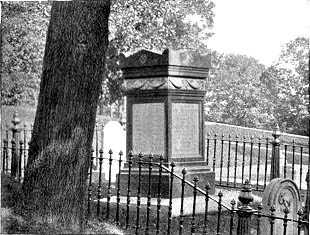|
To Edward Everett.
consecration of the cemetery, Judge Story said: "All around us there breathes a solemn calm, as if we were in the bosom of a wilderness, broken only by the breeze as it murmurs through the tops of the forest, or by the notes of the warbler, pouring forth his mating or his evening song. Nature seems to point it out with significant energy, as the favorite retirement for the dead." Perhaps in no part of Mount Auburn is the hush of solemn calm, of which the orator spoke, more deeply felt than about his own resting place, on Narcissus Path, on the edge of Forest Pond. The lot is enclosed with a granite curbing, and a plain marble shaft records the dates of the birth and death of the eminent jurist, who for thirty-four years adorned the bench of the Supreme Court of the United States, and whose simplicity and purity of character caused him to be as widely beloved as he was respected.
Four of the most distinguished statesmen whom Massachusetts has given to the nation, Choate, Everett, Sumner and Winthrop, are buried in Mount Auburn. The grave of Rufus Choate is on Walnut Avenue. Over it is an impressive, weather-worn sarcophagus of brown stone, bearing his name in old English text. Edward Everett was buried on Magnolia
Avenue, and the spot is marked by a stone of polished Scotch granite, with white marble panels. The grave of Charles Sumner is in Arethusa Path, near Walnut Avenue. The stone which marks it is of granite, with polished sides. On one side is his name, on the other the dates of birth and death, and on the ends a monogram. Contemporary with these three, but long surviving them into years of tranquil usefulness and philanthropy, occasionally distinguished by public service, Robert C. Winthrop was laid to rest late in November, 1894. His tomb is of red granite from Maine, part rough and part polished, surmounted by a cross. It is a fine piece of monumental work. In addition to name and dates, it has an inscription which truthfully describes him as "Eminent as a Scholar, an Orator, a Statesman, and a Philanthropist, above all as a Christian."
A statesman of an earlier day, Benjamin Franklin, is commemorated at

To Charles Sumner
-- page 11 --
|

